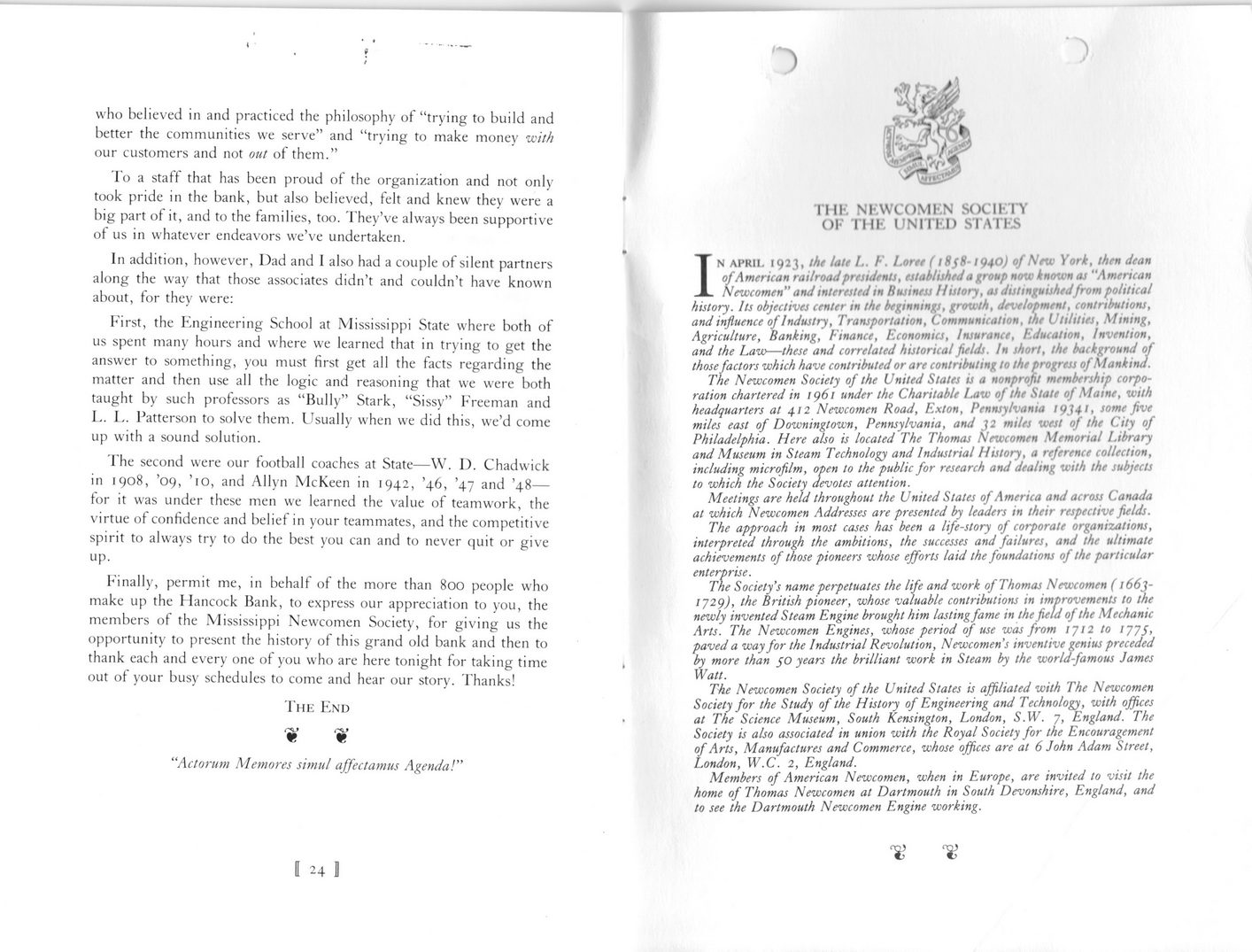This text was obtained via automated optical character recognition.
It has not been edited and may therefore contain several errors.
who believed in and practiced the philosophy of “trying to build and better the communities we serve” and “trying to make money with our customers and not out of them.” To a staff that has been proud of the organization and not only took pride in the bank, but also believed, felt and knew they were a big part of it, and to the families, too. They’ve always been supportive of us in whatever endeavors we’ve undertaken. In addition, however, Dad and I also had a couple of silent partners along the way that those associates didn’t and couldn’t have known about, for they were: First, the Engineering School at Mississippi State where both of us spent many hours and where we learned that in trying to get the answer to something, you must first get all the facts regarding the matter and then use all the logic and reasoning that we were both taught by such professors as “Bully” Stark, “Sissy” Freeman and L. L. Patterson to solve them. Usually when we did this, we’d come up with a sound solution. The second were our football coaches at State—W. I). Chadwick in 1908, ’09, ’io, and Allyn McKeen in 1942, ’46, ’47 and ’48— for it was under these men we learned the value of teamwork, the virtue of confidence and belief in your teammates, and the competitive spirit to always try to do the best you can and to never quit or give up. Finally, permit me, in behalf of the more than 800 people who make up the Hancock Bank, to express our appreciation to you, the members of the Mississippi Newcomen Society, for giving us the opportunity to present the history of this grand old bank and then to thank each and every one of you who are here tonight for taking time out of your busy schedules to come and hear our story. Thanks! The End % % “Actorum Memores simul affectamus Agenda!” THK NKWC'OMKN SOCIETY OF THK UNITED STATKS IN APRU. 1923, the late L, F. Loree (1858-1940) of New York, then dean of American railroad presidents, established a group note known as “American Newcomen" and interested in Business History, as distinguishedfrom political history. Its objectives center in the beginnings, growth, development, contributions, and influence of Industry, Transportation, Communication, the Utilities, Mining, Agriculture, Banking, Finance, Economics, Insurance, Education, Invention, and the Law—these and correlated historical fields. In short, the background of those factors which have contributed or are contributing to the progress of Mankind. The Newcomen Society of the United States is a nonprofit membership corporation chartered in 1961 under the Charitable Law of the State of Maine, with headquarters at 4.12 Newcomen Road, Exton, Pennsylvania 19J41, some five miles east of Downingtown, Pennsylvania, and J2 miles west of the City of Philadelphia. Here also is located The Thomas Newcomen Memorial Library and Museum in Steam Technology and Industrial History, a reference collection, including microfilm, open to the public for research and dealing with the subjects to which the Society devotes attention. Meetings are held throughout the United States of America and across Canada at which Newcomen Addresses are presented by leaders in their respective fields. The approach in most cases has been a life-story of corporate organizations, interpreted through the ambitions, the successes and failures, and the ultimate achievements of those pioneers whose efforts laid the foundations of the particular enterprise. The Society’s name perpetuates the life and work of Thomas Newcomen (1663-1729), the British pioneer, whose valuable contributions in improvements to the newly invented Steam Engine brought him lasting fame in the field of the Mechanic Arts. The Newcomen Engines, whose period of use was from 1712 to 1775, paved a way for the Industrial Revolution, Newcomen’s inventive genius preceded by more than 50 years the brilliant work in Steam by the world-famous James Watt. The Newcomen Society of the United States is affiliated with The Newcomen Society for the Study of the History of Engineering and Technology, with offices at The Science Museum, South Kensington, London, S.W. 7, England. The Society is also associated in union with the Royal Society for the Encouragement of Arts, Manufactures and Commerce, whose offices are at 6 John Adam Street, London, W.C. 2, England. Members of American Newcomen, when in Europe, are invited to visit the home of Thomas Newcomen at Dartmouth in South Devonshire, England, and to see the Dartmouth Newcomen Engine working. % %

Hancock Bank Leo-Seal-Leading-The-Way-(1987)-13